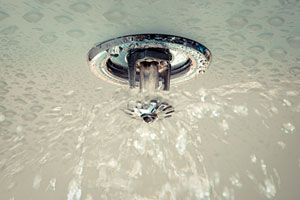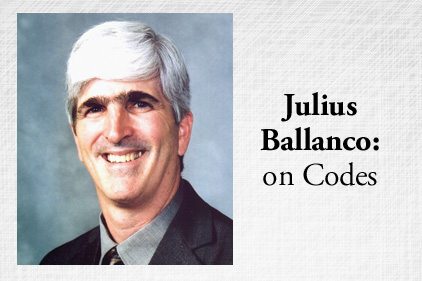
|
|
The 2015 ICC International Residential Code will continue to require all one- and two-family dwellings and townhouses to have sprinklers. Photo credit: ©istockphoto.com/JimmiLarsen |
One of the common questions regarding the ICC International Residential Code is: Will the mandatory sprinkler requirements remain?
The answer is a resounding yes! The 2015 ICC International Residential Code will continue to require all one- and two-family dwellings and townhouses to have sprinklers.
Changes were made to the building requirements regarding when sprinklers are not installed even though the code mandates sprinklers. Various incentives were added to the IRC where sprinklers are mandated.
These incentives lower the cost of construction and many times offset additional costs for installing a sprinkler system. With many states passing legislation that does not permit the mandating of sprinklers in one- and two-family dwellings, requirements were added that indicate if a sprinkler system is not installed you must do the following:
For townhouses, you would be foolish not to install a residential sprinkler system. The design incentives more than offset the cost of a sprinkler system. I have had many developers voluntarily add sprinklers to new townhouse projects when they realized the incentives they received, even though the state did not adopt sprinkler requirements.
Many states currently are reconsidering the IRC requirements for townhouses. These developers are not opposed to sprinkler requirements, unlike the one- and two-family dwelling builders. A number of states already mandate sprinklers for townhouses and I expect more to follow suit.
Plumbing code
There were many minor changes made to the plumbing code. The more significant changes included a reference to NSF 372 – the new standard that determines whether a plumbing pipe, fitting, fixture or component complies with new federal no-lead legislation. While the government passed the no-lead law, it really left no means for enforcing this requirement other than taking someone to court.
By adding NSF 372 to the IRC (and the International Plumbing Code), the no-lead requirement will need to be enforced by the local plumbing inspector. The no-lead enforcement belongs with the local inspector and not in the hands of the government.
In addition to adding the reference to NSF 372, the IRC retained a requirement for compliance with the maximum 8% lead for nonpotable water or cooking applications. In its infinite wisdom, the Environmental Protection Agency removed the requirement for a maximum 8% lead for nonpotable water components. The EPA simply assumed the plumbing codes would continue to regulate this requirement. Fortunately, the plumbing codes have.
Typical nonpotable water requirements include: shower valves, tub fillers, flushometer valves, ballcocks, certain backflow preventers, etc. None of these devices supply water for drinking, food preparation, oral hygiene or dishwashing. This is the latest definition used by the government.
There were a number of code changes attempting to lower the flow rate requirements for plumbing fixtures in the IRC. All of these provisions failed and the membership was more inclined to include such requirements in the Green Code.
Another proposed change was brought up regarding tankless water heaters. The change stated that tankless water heaters would only be required to have protection from a pressure-relief valve. This has been a subject of discussion for some time. The contention is that without a storage capacity, there is no possibility of building up steam with an instantaneous liberation of energy. There is validity to this claim. However, the membership voted to keep the requirement for both temperature and pressure-relief protection.
One of the code changes receiving engineering input was a proposal to mandate expansion tanks when a check valve or backflow preventer was installed on the cold water supply to a water heater. The current code requires an expansion tank or other means of controlling pressure. It never was clear why the proponent wanted to remove the other means of protection. The ICC membership rejected the code change allowing any methods for addressing thermal expansion.
Hot-water recirculation was proposed for residential buildings, similar to the requirement in the IPC. All the proposed recirculation changes were rejected. The IRC will continue to not require hot-water recirculation, even though it should be installed (and required) in larger residences.
It’s a trap
One of the most surprising recommendations from the IRC Plumbing and Mechanical Code Change Committee was the recommendation to add in-line sanitary waste valves to the code as equivalent to a trap. If you are not familiar with in-line sanitary waste valves, they are basically devices with a pipe section that collapses to close off the opening to the drainage system. When flow reaches the device, it opens to allow the flow into the drainage system. Once the flow passes the in-line sanitary waste valve, it closes.
The trap has always been considered a sacred device in plumbing systems. The only purpose of a trap is to prevent the leakage of sewer gas into a building. The proponent claimed the in-line sanitary waste valve is not only equivalent, but many times better than a trap seal. There also have been claims that an in-line sanitary waste valve is equivalent to both a trap and an air-admittance valve, hence no venting would be required for the device. That was not a part of the proposal, but one could read into the proposal since there were no changes proposed to require venting when one installs an in-line sanitary waste device.
With a recommendation to approve the code change, only a simple majority was required to approve the in-line waste valve. However, the change was overwhelmingly defeated by the ICC membership.
As 2013 comes to an end you can look forward to ICC publishing the 2015 editions of the International codes, including the plumbing, mechanical, fuel gas and residential codes, this coming year. ICC promised to have the codes published before Jan. 1, 2015. The concept is to allow jurisdictions to adopt the code in the year it is dated.
Rather than worrying about codes, I hope all of you have the time to enjoy family and friends during the holidays. I wish all of you a Merry Christmas, Happy Chanukah and a prosperous New Year.



